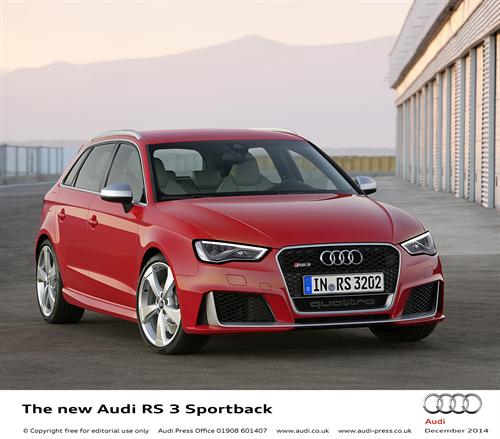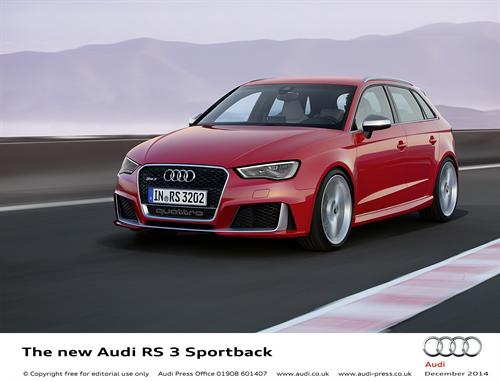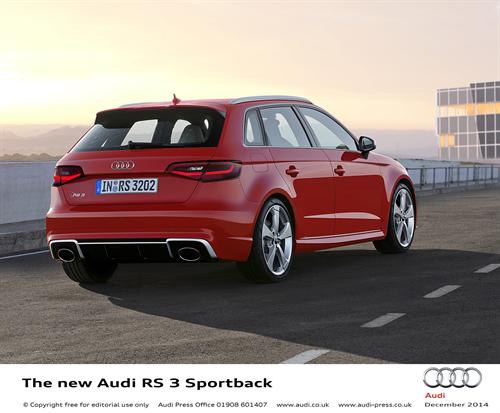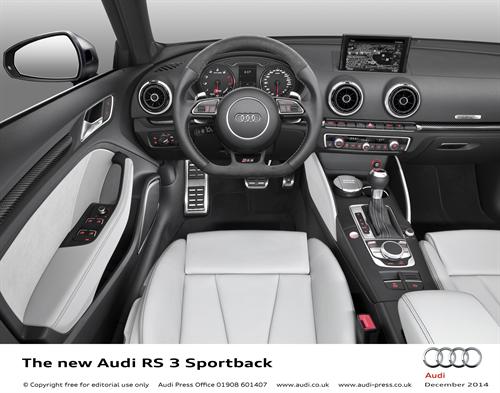 Latest generation Audi high performance hatchback continues to honour classic Eighties quattros with highly evolved five-cylinder turbo power
Latest generation Audi high performance hatchback continues to honour classic Eighties quattros with highly evolved five-cylinder turbo power
- New flagship of the A3 model series available to order in the UK from March 2015 ahead of first customer deliveries next summer
- Most powerful production five-cylinder engine in Audi RS history with 367PS and 465Nm from 1,625rpm to 5,550rpm
- 0 – 62mph in 4.3 seconds – 0.3 seconds faster than the previous model – 155mph governed top speed can be raised to 174mph on request
- Lower weight, faster-shifting S tronic twin-clutch gearbox, faster-reacting quattro drive
When world-beating car meets class-conquering engine, the formidable result is the all new 367PS Audi RS 3 Sportback. The DNA for the world’s most powerful series production premium compact hatchback comes courtesy of the A3 hatchback – the 2014 World Car of the Year – and the latest evolution of the evocative 2.5-litre five-cylinder TFSI – the International Engine of the Year in the 2.0 to 2.5-litre category. Enhanced by latest generation quattro all-wheel-drive, these genes create a car with truly exceptional dynamic capabilities, but one which can also deftly handle everything that daily life throws at it.
“There is a long tradition of five-cylinder engines at Audi,” says Prof. Dr. Ulrich Hackenberg, Board Member for Technical Development at AUDI AG. “In the 80s, they turned Audi into a sporty brand, both in motor sports and in production. The new Audi RS 3 Sportback features the latest generation of our 2.5 litre, five-cylinder engine – the most powerful production engine in the modular transverse matrix.”
Due to become available in the UK in March 2015, and expected to reach its first owners here next summer, the extreme high performance hatchback bolsters the 367PS output from its 2.5-litre TFSI with 465 Nm (343.0 lb-ft) of torque, which is available right from 1,625rpm through to 5,550rpm, enabling it to punch vigorously at the horizon in any gear and at virtually any speed.
Lighter, faster, more efficient
Helped by advances in construction processes and material use made as part of the Audi ultra efficiency programme, the successor to the original RS 3 Sportback weighs in 55kg lighter, tipping the scales at 1,520kg (without driver), despite additional equipment and safety features. Against the clock its resulting power-to-weight ratio of 241PS per ton helps it to clear the 62mph marker from rest in just 4.3 seconds, and to continue to an electronically governed 155mph top speed which, for drivers with regular Autobahn access, can be increased on request to 174mph.
The distinctive rhythm of the 1 – 2 – 4 – 5 – 3 five-cylinder ignition sequence – the classic Audi soundtrack played out since the 1980s by rally cars, touring cars and production models such as the Ur quattro, the RS 2 and the TT RS – washes over the cabin as the new RS 3 Sportback gathers momentum. Two flaps in the exhaust pipes control the exhaust flow to provide for an even more intensive sound experience that varies with engine load and speed, and the driver can control these flaps via the Audi drive select adaptive dynamics system, which is standard. For the first time in an Audi model at this level, the already fittingly bass-heavy RS exhaust system can be replaced at extra cost by an even richer-sounding sports exhaust upgrade.
In the latest edition of the classic engine increased power and torque goes hand in hand with improved efficiency, which is confirmed by its compliance with the latest EU6 emissions regulations. According to the NEDC consumption test the new ‘entry level’ RS model is capable of returning up to 34.8mpg, corresponding to CO2 emissions of 189g/km. A recuperation system, a demand-controlled oil pump and a newly developed start-stop system which turns off the engine shortly before the car comes to a stop contribute to this impressive data.
A seven-speed S tronic transmission, which has been reworked to offer even faster shifts, directs the power to the quattro permanent all-wheel drive system. The quattro system features torque vectoring based on intelligent software and is designed with maximum driving enjoyment foremost in mind. Its central component is an electronically controlled, hydraulically activated multi-plate clutch, the weight of which has been reduced by 1.4kg as further evidence of the adherence to the principles of Audi ultra throughout the car.

Variable quattro response
The clutch is mounted on the rear axle in the interest of balanced load distribution, and the parameters its bespoke RS 3 software works to can be controlled via the Audi drive select system. Depending on driving style and the coefficient of friction, it can send between 50 and 100 percent of the available torque to the rear axle, and when Audi drive select is in dynamic mode and the ESC Electronic Stabilisation Control system is in its sport setting, power is transferred to the rear sooner and in greater amounts for even greater agility and more direct turn-in. In this mode the driver can even perform controlled drifts on low-friction road surfaces. ESC can also be completely deactivated by pressing and holding the button.
The chassis of the five-door model also sets new standards. Compared with the Audi A3 Sportback, the body sits 25 millimetres lower, and the track of the McPherson front suspension has been widened to 1,559 millimetres. It incorporates specially developed, high-strength aluminium pivot bearings. The rear axle, which has a track width of 1,514 millimetres, is a four-link construction with rods of high-strength steel that handle the longitudinal and lateral forces separately.
The new progressive steering system is standard, and is capable of varying its ratio between 15.3:1 and 10.9:1 as a function of steering input. Its efficient, electromechanical servo boost has RS-specific settings.
The Audi magnetic ride adaptive damper system with its magnetorheological fluid-filled dampers that can be influenced by an electric current is available as an option. Its operating characteristics are adjustable via Audi drive select with its comfort, auto, dynamic and individual modes.
The internally ventilated disc brakes measure 370 millimetres in diameter at the front and 310 millimetres at the rear. The front friction rings feature a weight-saving wave design and are perforated for maximum heat dissipation. Pins connect them to aluminium brake caps, and they are gripped by eight-piston fixed calipers painted black (red optional) with RS logos.

Optional ceramic brakes
Among the technologies that differentiate the new Audi RS 3 Sportback from its competitors are the optional carbon fibre-ceramic brake discs on the front axle. They also measure 370 millimetres and are gripped by anthracite grey calipers.
The acclaimed framework within which all this advanced technology is integrated is the Volkswagen Group’s modular transverse matrix (MQB) with its strict lightweight construction concept. The occupant cell contains many components of ultra-high-strength and hot-shaped steels, and the bonnet is made of aluminium. The transverse orientation of the engine in combination with the multi-plate clutch and the battery, which are located in front of and behind the rear axle, respectively, contributes to a favourable axle load distribution.
The remarkable capabilities that render this car worthy of the RS badge are also visually referenced at the front of the car by the high-gloss black, honeycomb-look treatment for the Singleframe grille with its matt aluminium-look frame, by the pronounced air intake below the license plate frame and by the large side intakes framed by bold contours. The blade integrated into the front apron extends upward into the air intakes to form a vertical dividing bar.
Viewed in profile, the widened front wings, chiselled side sills, matt aluminium-look mirror housings and large roof spoiler immediately catch the eye, while at the rear the differentiation is clearly made by a remodelled bumper with high-gloss black diffuser insert, honeycomb grille and four bars, from which two large, oval tailpipes boldly protrude. Eight paint finishes will be available, including the two new shades Nardo grey and Catalunya red, metallic, the latter available exclusively for the RS 3 Sportback.
Dedicated individualists can order additional optional distinguishing features, including 19-inch matt titanium or high-gloss anthracite black machine polished alloy wheels as an alternative to the 19-inch five-arm rotor design fitted as standard,
a carbon engine cover and styling packages in matt aluminium and gloss black which also include a quattro logo in titanium grey in the air inlet.
The purposeful black interior of the RS 3 Sportback also befits its status. Its sports seats are upholstered in Fine Nappa leather with contrasting stitching in rock grey, and the driver’s is perfectly positioned in relation to the flat-bottomed RS multifunction sports steering wheel with its leather and Alcantara trim. Stainless steel pedals, Alcantara door inserts and inlays in either 3D design black or optional Aluminium Race or Carbon also help to set the tone. High-quality applications in gloss anthracite black frame the instruments, which include black-faced dials with red needles and white scales, plus a driver‘s information system enhanced by a boost pressure indicator, an oil temperature gauge and a lap timer.

Lighter RS buckets seats
Standard equipment will of course be in keeping with this model’s ranking in the A3 line-up, as will the list of attractive options. For the first time in a compact class Audi this will include newly developed RS bucket seats with integrated side airbags and a carbon seat shell which are seven kilograms lighter than the standard sports seat. It will also offer an RS 3 interior design package with red accents on the seats, knee pads, air vents,floor mats and seat belts.
The infotainment and driver assistance systems familiar from the wider A3 range will naturally also be available, including MMI navigation plus with MMI touch and Audi connect bringing internet-based services to the car.
The new RS 3 Sportback takes the total number of RS models offered by quattro GmbH, the high-performance subsidiary responsible for developing and building the most extreme models in the Audi portfolio, to seven. The newcomer joins the RS Q3, RS 4 Avant, RS 5 Coupé and Cabriolet, RS 6 Avant and RS 7 Sportback.
